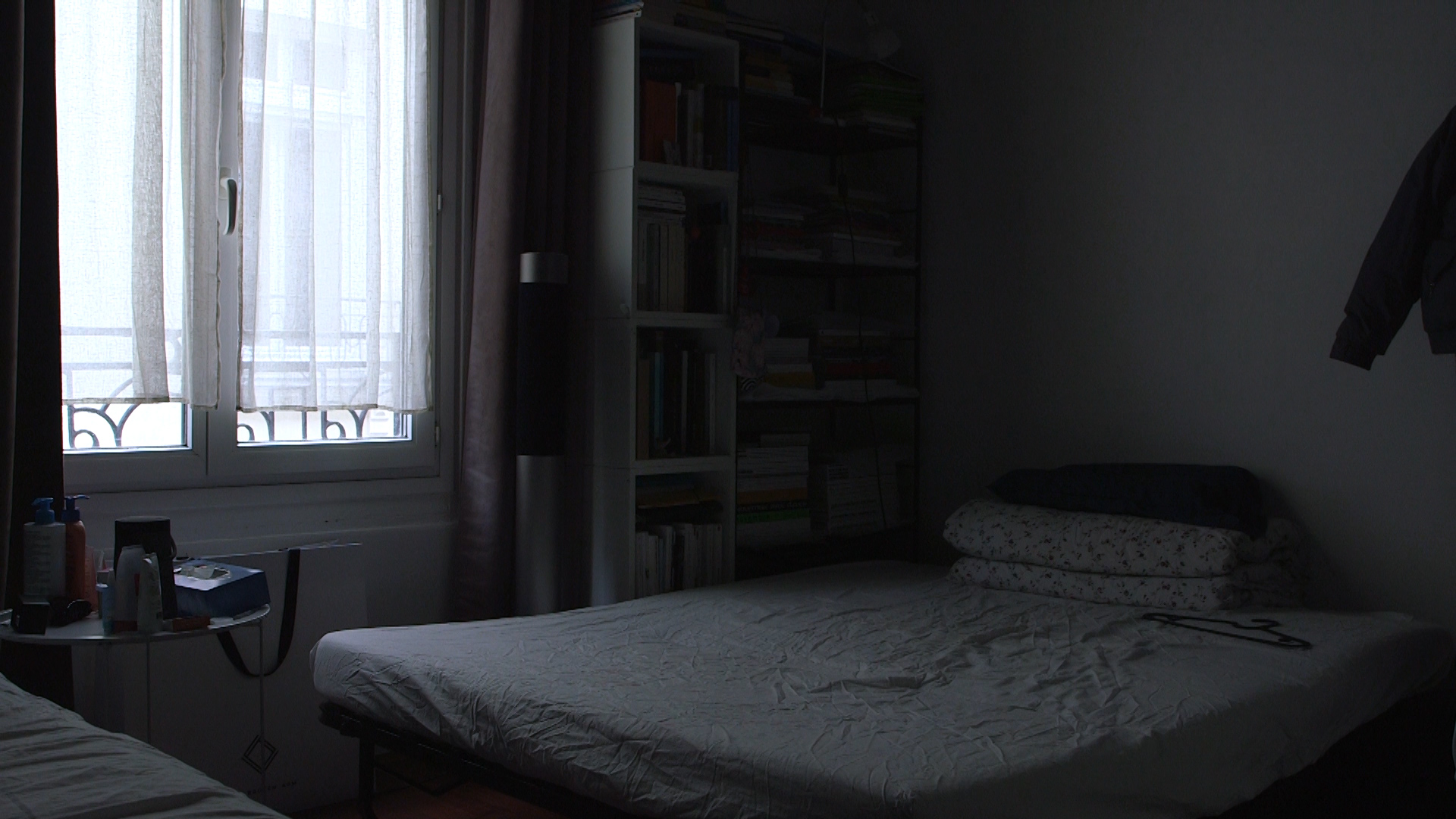山中無樹
IS THERE A PIN ON THE MOUNTAIN
2022
Documentary
38 mins

This was my last work of moving image before the global pandemic began. From this perspective, it was created under the mindset of an impending, yet unrecognised crisis (a dual crisis of sorts), a mindset that underwent significant changes during the COVID epoch.
The film focuses on the time my ex-partner’s mother came to stay with us in our small Parisian flat. I initiate the film with an acidic argument, followed by introspective and reflective conversations with both the mother and my then-boyfriend. I found myself capturing how a repressive familial hierarchy within Chinese families is passed down generationally, with its core issue being a pathological patriarchal ideology. By exploring this phenomenon on a micro-level—my own experience of being trapped in an abusive relationship—I hope to exhume the root causes and retroactively diagnose that which had me blindsided.
For many, the pandemic was a tumultuous period; our reality was warped, conjuring up a pervasive sense of unease within the quotidian. For me, this unease was mixed with fear—a fear for my personal safety. In the final stages of Paris’s first lockdown, I realised (and I believe he did too, to some extent) that the cycle of domestic violence, which manifested itself first during his own childhood, was beginning to emerge. It is my view he was in full control of his faculties and chose not to rally against such vices, exerting psychologically manipulative behaviour wherever he could.
When I resisted, and especially at the suggestion he seek out external help, he became physically violent; the self-fulfilling prophecy came to pass and I had to bear the brunt of that aggression whilst in lockdown.
The methods he employed escalated from one extreme to the next. Even after the inevitable separation, he resorted to intimidation tactics: hacking into my social media, and contacting friends of mine with appeals for information. The immediate solution was to block him, but then he would simply counteract this by making new accounts.
His mother left before the outbreak, and our relationship rapidly deteriorated shortly thereafter, with the question becoming when, not if, to escape. Somewhat ironically, the film was originally planned to be a charming family video – where together we could one day look back and reminisce; it instead became the final straw. After a year of reflection on how I was to adapt, I decided to mask the faces and modify the voices of him and his mother. Essentially, this is my farewell to the life I once shared with him: from now on, I view this past – this slice of time – solely as an artist, and I create with the residuals.
Thus, this film was reborn, with the characters’ faces opaque: the distinctly human facial architecture no longer a part of their form. It is adrift; pixelated out of shape. But this doesn’t prevent us from realising we are witnessing a Chinese woman visiting her son studying in Paris. Stripped of any concrete identity, they become archetypes.
The film focuses on the time my ex-partner’s mother came to stay with us in our small Parisian flat. I initiate the film with an acidic argument, followed by introspective and reflective conversations with both the mother and my then-boyfriend. I found myself capturing how a repressive familial hierarchy within Chinese families is passed down generationally, with its core issue being a pathological patriarchal ideology. By exploring this phenomenon on a micro-level—my own experience of being trapped in an abusive relationship—I hope to exhume the root causes and retroactively diagnose that which had me blindsided.
For many, the pandemic was a tumultuous period; our reality was warped, conjuring up a pervasive sense of unease within the quotidian. For me, this unease was mixed with fear—a fear for my personal safety. In the final stages of Paris’s first lockdown, I realised (and I believe he did too, to some extent) that the cycle of domestic violence, which manifested itself first during his own childhood, was beginning to emerge. It is my view he was in full control of his faculties and chose not to rally against such vices, exerting psychologically manipulative behaviour wherever he could.
When I resisted, and especially at the suggestion he seek out external help, he became physically violent; the self-fulfilling prophecy came to pass and I had to bear the brunt of that aggression whilst in lockdown.
The methods he employed escalated from one extreme to the next. Even after the inevitable separation, he resorted to intimidation tactics: hacking into my social media, and contacting friends of mine with appeals for information. The immediate solution was to block him, but then he would simply counteract this by making new accounts.
His mother left before the outbreak, and our relationship rapidly deteriorated shortly thereafter, with the question becoming when, not if, to escape. Somewhat ironically, the film was originally planned to be a charming family video – where together we could one day look back and reminisce; it instead became the final straw. After a year of reflection on how I was to adapt, I decided to mask the faces and modify the voices of him and his mother. Essentially, this is my farewell to the life I once shared with him: from now on, I view this past – this slice of time – solely as an artist, and I create with the residuals.
Thus, this film was reborn, with the characters’ faces opaque: the distinctly human facial architecture no longer a part of their form. It is adrift; pixelated out of shape. But this doesn’t prevent us from realising we are witnessing a Chinese woman visiting her son studying in Paris. Stripped of any concrete identity, they become archetypes.
